Are you a new cat parent or considering deworming your feline friend? It’s important to know the consequences of deworming so that you can be prepared for any changes in your cat’s behavior or health.
Deworming is a vital part of caring for cats, as it helps keep them healthy and free of parasites. But if you don’t know what to expect after deworming a cat, it can be scary and confusing.
That’s why we’re here to help. In this blog post, we’ll explore the consequences of deworming on cats, including potential side effects and how long it takes for the drug to take effect. Plus, we’ll have tips on how to care for your cat during and after surgery. So, if you want to learn more about deworming a cat, read on.
Types of Worms that Cats Can Get
Cats can be vulnerable to various types of worms, and the symptoms they exhibit may vary depending on the type of worm they have. Roundworms, tapeworms, hookworms, and whipworms are the most common worms found in cats.
Roundworms are typically contracted through their mother’s milk or by ingesting an infected animal. Symptoms of roundworm infestation may include vomiting, diarrhea, and a pot-bellied appearance.
Tapeworms can be acquired by ingesting fleas or infected rodents and may not always show symptoms but might shed segments resembling grains of rice in their feces or on their fur.
Hookworms are spread through ingestion, skin contact, or through their mother’s milk and can cause diarrhea, weight loss, and anemia in cats. Whipworms are less common in cats but can still be contracted through ingestion or contact with contaminated soil and might present symptoms such as bloody diarrhea and weight loss.
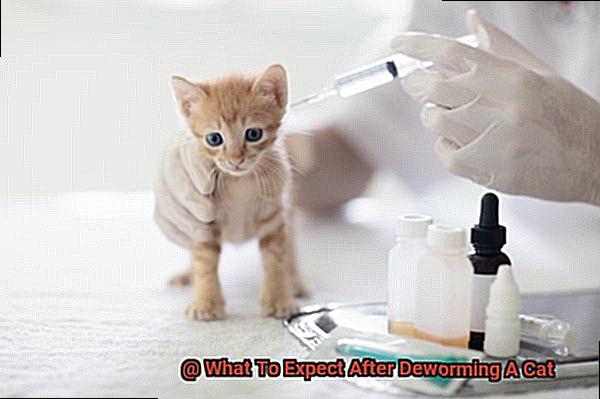
It is important to note that these worms can cause serious health problems for cats and even potentially spread to humans. To protect a cat’s health and prevent infestations from occurring, veterinary professionals recommend routine deworming and regular fecal exams.
After deworming a cat, pet owners should expect some minor side effects such as vomiting or diarrhea that can persist for a day or two; these can be addressed with simple foods and plenty of water.
Additionally, it is also recommended that you administer a second round of deworming tablets 2-4 weeks after the first treatment to ensure that all worms are eradicated.
Symptoms of a Worm Infestation in Cats
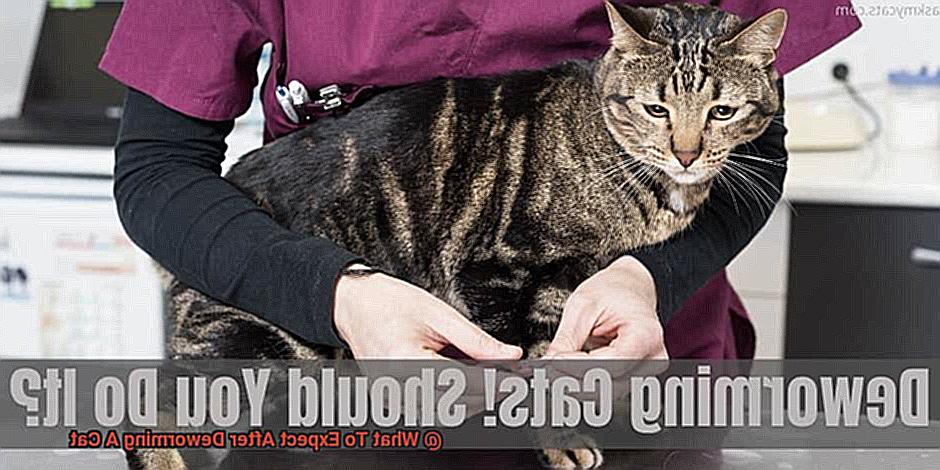
Cats are beloved companions, but they can be vulnerable to worm infestations. It’s essential to know the symptoms of a potential outbreak so that you can take the necessary steps to protect your cat and your family.
The signs of a worm infestation in cats vary depending on the type of parasite present. Common symptoms include diarrhea, vomiting, weight loss, and a dull coat. Your cat may also be lethargic, have a decreased appetite, or display signs of abdominal discomfort such as bloating or cramping.
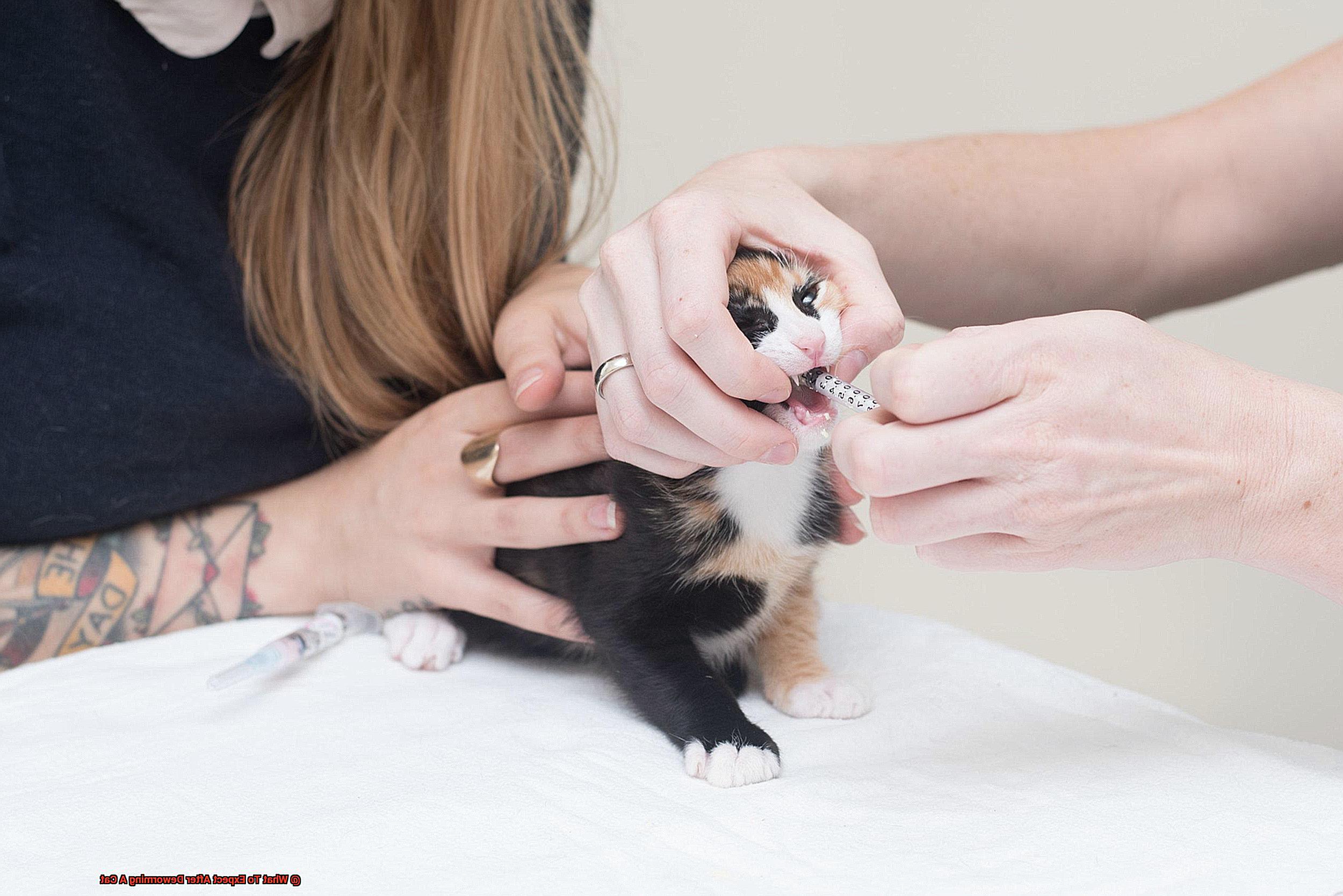
Roundworms can cause coughing as they migrate to the lungs. Tapeworms may lead to irritability, restlessness, and the presence of rice-like segments in their feces.
It’s important to note that some worms can be spread from cats to humans, such as hookworms and roundworms which can cause skin irritation and other symptoms.
Therefore, it is essential to keep an eye on your cat’s health and take them for regular checkups and deworming treatments to prevent further complications.
How to Tell if Your Cat Needs Deworming
Knowing the signs and symptoms of a worm infestation in cats is key to ensuring your pet’s health. Common symptoms include diarrhea, vomiting, weight loss, anemia, and a swollen abdomen. If you notice any of these signs in your cat, it’s best to take them to the vet as soon as possible.
If your veterinarian suspects your cat has worms, they may request a stool sample to help determine the presence of intestinal parasites. In addition, they can perform a physical exam and conduct additional testing if necessary.
Preparation for Deworming a Cat
When it comes to taking care of your cat’s health, deworming is an important step that should not be taken lightly. To ensure that the process goes as smoothly as possible, there are some key steps you should take before administering the medication.
First, make sure you have the right dewormer for your cat’s specific needs. Different types of worms require different treatments, so consult with your veterinarian before giving any medications.
It is also recommended that you fast your cat for 12-24 hours prior to administering the dewormer. This will help to clear their system and allow the medication to be properly absorbed. Additionally, provide plenty of water both before and after deworming – dehydration can cause more discomfort and worsen the situation.
Finally, monitor your cat’s behavior and signs after deworming. While most cats will experience only mild side effects, some may develop more serious issues such as vomiting or diarrhea. If this occurs, contact your veterinarian immediately.
Treatment Options for Deworming a Cat
Treating your cat for worms is an essential part of their overall health and wellbeing. Fortunately, there are many deworming options available, ranging from prescription medications to natural remedies.
Prescription drugs are often the most effective option for treating a cat with worms. These medications are specifically designed to target and kill different types of worms, such as tapeworms, roundworms, and hookworms. They come in both pill and liquid form and are administered orally.
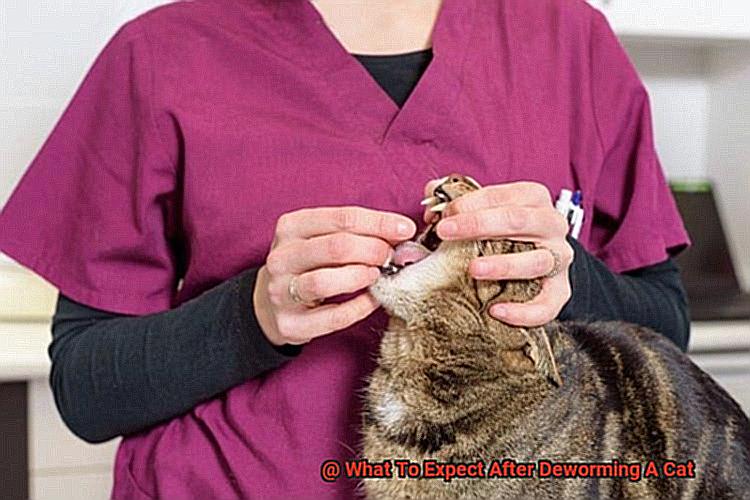
For those who prefer a more natural approach, there are several deworming options available.
One option is feeding your cat food that is high in fiber, such as pumpkin. This helps to naturally expel worms from the digestive tract. Another option is administering natural remedies, such as diatomaceous earth or garlic, which have natural anti-parasitic properties.
However, it is important to consult with a veterinarian before using any form of natural remedy to ensure that it is safe for your cat.
Regular deworming is also recommended to prevent future infestations. It is generally recommended to deworm cats every 3-4 months.
After each round of treatment it is important to follow up with your veterinarian to ensure that the worms are gone and that your cat remains healthy and happy.
Side Effects After Deworming a Cat
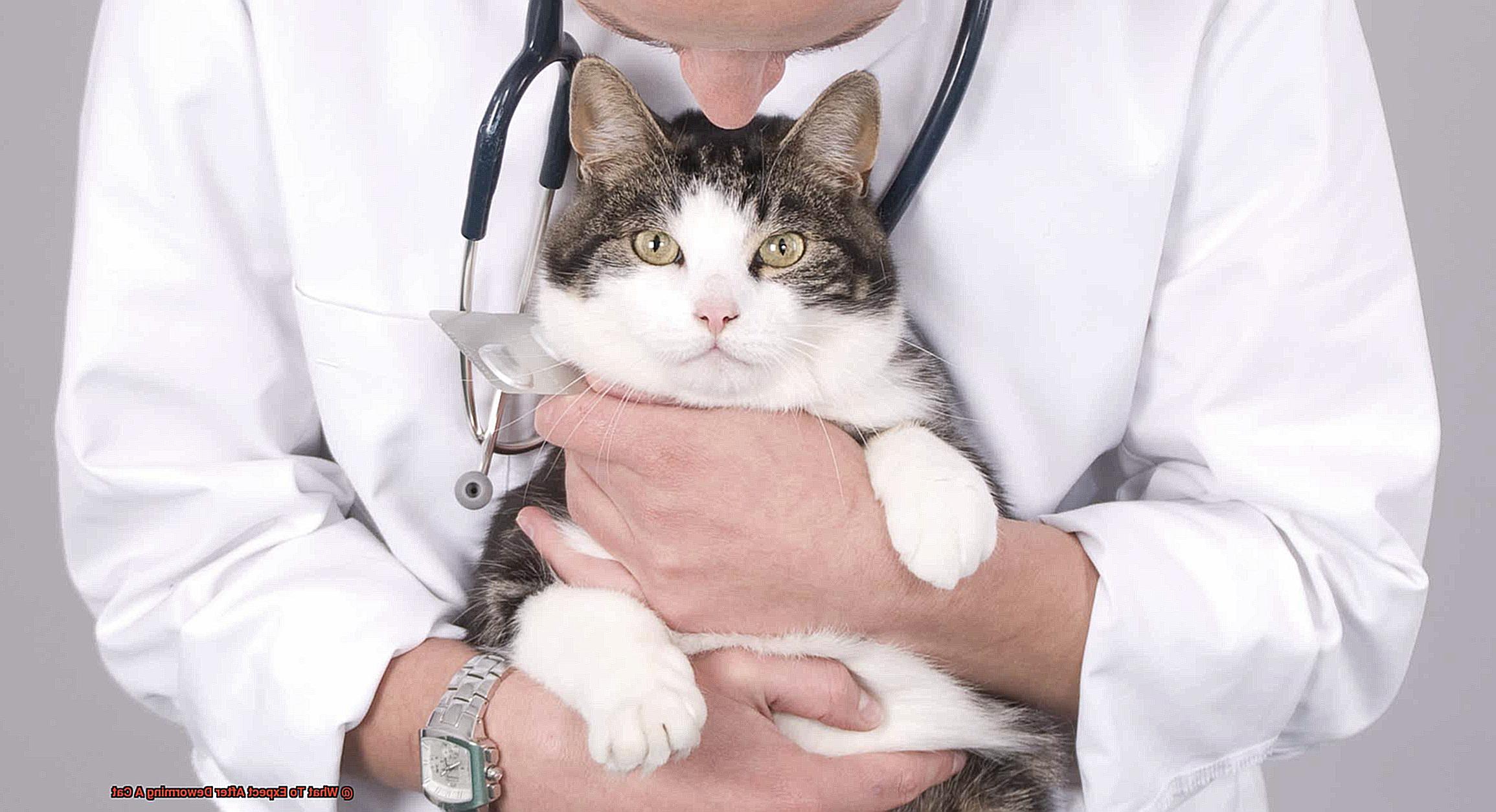
Deworming your cat is an essential part of keeping them healthy and happy. However, it is important to be aware of the potential side effects that may occur after deworming a cat.
Common side effects include vomiting, diarrhea, lack of appetite, and lethargy. These symptoms usually last for a day or two and are generally mild in nature. If they persist for longer than that or become severe, it is best to contact your veterinarian.
Additionally, dead worms may be present in your cat’s feces after the deworming treatment has been administered, which is a sign that the medication is working.
To reduce the severity of any side effects and ensure that your cat recovers quickly, make sure they have plenty of water and a balanced diet. Additionally, keep their environment clean by washing bedding and toys regularly and emptying their litter box often.
It is also recommended to give a second round of deworming drugs 2-4 weeks after the first treatment to ensure all worms are eradicated.

Signs That the Deworming Medication Is Working
It’s important to make sure that your furry friend is getting the care they need. Fortunately, there are a few tell-tale signs that will help you determine whether the medication is doing its job.
First and foremost, watch out for worms in your cat’s feces. If you see live worms, dead worms or even worm segments in their stool, it’s a good indication that the deworming medication is eliminating the parasites from their body.
Additionally, if your cat was experiencing heavy infestations before treatment, you may notice a drastic decrease in the number of worms they are passing after taking the drug.
You may also observe an increase in appetite as another sign that the deworming medication is working well. Worms can cause a decrease in hunger, and if the drugs start doing their job, their appetite should rise significantly.
Plus, their coat may become shinier and healthier looking – another indication of improved overall health.
It’s important to note that every cat responds differently to deworming drugs, and recovery times can vary. However, if you’re seeing any of these signs within a few days to a week after surgery, it’s likely that the drug is functioning as expected.
Preventative Measures to Avoid Re-infestation
No one wants to think about their beloved cat getting worms, but it can be a reality for many pet owners. Thankfully, deworming medications can help get rid of the parasites and keep your cat healthy. To ensure that your cat stays worm-free, it’s important to take preventative measures afterwards.
Start with making sure your cat’s litter box is always clean and free of feces. Some types of worms can be passed through feces, so make sure you scoop out any waste at least twice a day and replace the entire litter box once a week. Additionally, keeping your cat indoors can also reduce their chances of being contaminated with worms from other animals.
Good hygiene habits are also key when it comes to preventing worms in cats. Always wash your hands before and after handling your cat, as well as disinfecting any surfaces they may come into contact with, such as food and water bowls.
Also, don’t forget to de-flea your cat with a flea preventative drug prescribed by your veterinarian; this will help minimize the risk of worm transmission through fleas.
gni_irXtF4E” >
Conclusion
Deworming a cat is an essential part of pet parenthood. Knowing the consequences, types of worms, and how to tell if your cat needs deworming are all important steps in keeping your feline friend healthy and happy.
Roundworms, tapeworms, hookworms, and whipworms are the most common worms found in cats. Symptoms can include diarrhea, vomiting, weight loss and anemia.
To determine if your cat has worms, a stool sample or additional testing may be ordered by your veterinarian.
Prescription drugs are the most effective way to treat worm infestations; however, natural remedies are available for those who prefer a holistic approach.
Side effects of deworming are usually mild but may include vomiting or diarrhea; these can be addressed with simple foods and plenty of water.
Additionally, it’s recommended that a second round of deworming tablets be administered 2-4 weeks after the initial treatment to ensure all worms have been eradicated.
To prevent future infestations, wash hands before and after handling your pet; sweep litter boxes regularly; and administer regular deworming treatments every 3-4 months.







